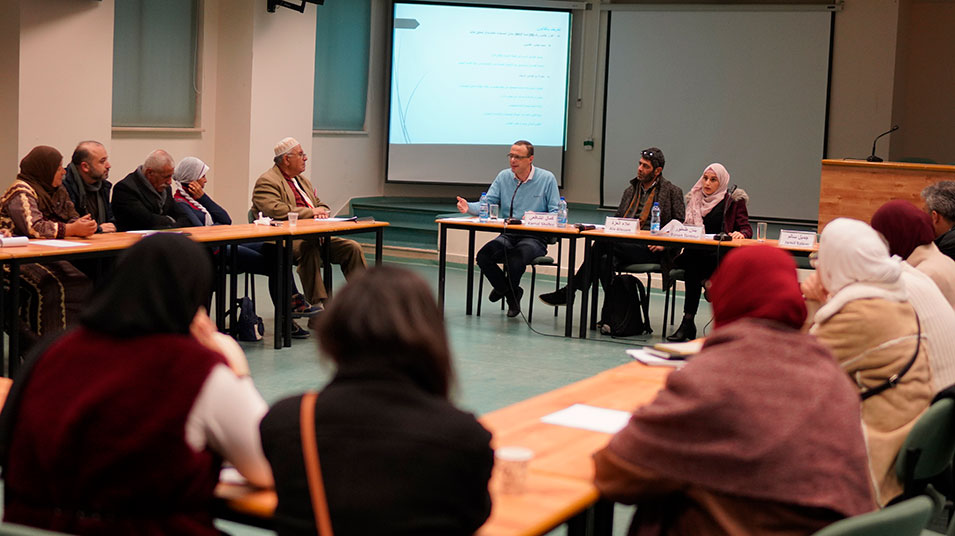Legal encounter on the legal framework governing cooperative work in Palestine
Birzeit University’s Institute of Law, the master’s program in law at the Faculty of Law and Public Administration, and Konrad Adenauer Institute held a legal encounter titled “The Legal Framework of the Cooperative Work in Palestine.
The encounter featured Kamal Al-Shafei, a legal advisor to the Cooperative Work Agency (CWA); Bana Tantour, a legal assistant at CWA; and Ala Alazzeh, the head of the Department of Social and Behavioral Sciences at Birzeit University.
Mohammed Alqaisi, director of the master’s program in law, in his opening remarks deemed cooperative work a crucial component of efforts to develop any national economy. He assured that in Palestine, cooperative work is showing notable progress, as numerous cooperative agencies have been established.
Al-Shafei shed light on the concept of cooperative work, pointing out that it is the third most important state sector after the government and the private sector. He highlighted that experience in other countries has proven its significance and confirms its positive impact on the economy. He explained that cooperative work engages individuals in a form of sharing that requires an organized legal framework embodied in a democratic, self-funded institution.
Al-Shafei explained that the core concepts that define cooperative agencies lie in three international documents. The International Co-operative Alliance, founded in 1895, is of utmost importance as it is the first institution to establish a specific definition of cooperative agencies and cooperative principles, listing characteristics such as self-aid, self-responsibility, democracy, equality, fairness, solidarity and social responsibility.
Discussing the legal framework governing cooperative work in Palestine, Al-Shafei recounted that efforts to create laws that organize this sector started in 1996, whereas the actual law was issued in 2017 as Decree Law No. 20, stipulating the foundation of CWA. Al-Shafei praised the Palestinian experience as unique in this regard, as it is managed jointly by the Palestinian government, CWA and other Palestinian cooperative agencies.
Banan Tantour further explained Decree Law No. 20 defining what is cooperative work, its general principles, and the creation of CWA. It covers the agency’s management, administration and responsibilities.
Al-Shafei then talked about the issues cooperative work in Palestine is facing, explaining how they affect its legal framework and all practical interventions. He explained that the decree law stipulated the revocation of all laws and regulations that, before its issuance, had organized cooperative work in Palestine, thus making this law the sole legal framework governing cooperative work locally.
It is important to note, however, Al-Shafei added, that the decree law left a legal vacuum regarding important relevant cases and circumstances. For instance, in addition to textual contradictions in the law itself, the decree law prevents that regulations issued by the Palestinian Council of Ministers can be executed. Al-Shafei also pointed out that the core issue affecting cooperative work in Palestine lies in external financing, its main source of funding, that has forced many cooperative agencies to work in fields other than originally intended.
Alazzeh confirmed that the decree law regarding cooperative agencies does not take into consideration the conditions of Palestinian society under occupation. He stated that the programs and interventions of cooperative agencies in Palestine must be tailored better to the needs of Palestinian society. Alazzeh called for connecting cooperative work with the struggle against the occupation, stressing that any legal framework governing cooperative work must be established on a basis that reflects these needs.
The legal encounter ended with an open discussion session in which questions regarding a number of interventions were raised.
The encounter is part of a series of legal encounters and meetings Birzeit University’s Institute of Law is holding in the West Bank and Gaza.







